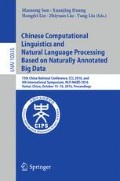Abstract
Definition extraction is the task to identify definitional sentences automatically from unstructured text. The task can be used in the aspects of ontology generation, relation extraction and question answering. Previous methods use handcraft features generated from the dependency structure of a sentence. During this process, only part of the dependency structure is used to extract features, thus causing information loss. We model definition extraction as a supervised sequence classification task and propose a new way to automatically generate sentence features using a Long Short-Term Memory neural network model. Our method directly learns features from raw sentences and corresponding part-of-speech sequence, which makes full use of the whole sentence. We experiment on the Wikipedia benchmark dataset and obtain 91.2 % on \(F_1\) score which outperforms the current state-of-the-art methods by 5.8 %. We also show the effectiveness of our method in dealing with other languages by testing on a Chinese dataset and obtaining 85.7 % on \(F_1\) score.
Access this chapter
Tax calculation will be finalised at checkout
Purchases are for personal use only
Notes
- 1.
You can download it from http://166.111.7.170:28090/zh.zip.
- 2.
- 3.
Our pos tagger tool is from http://nlp.stanford.edu/software/tagger.shtml.
- 4.
- 5.
You can download it from http://166.111.7.170:28090/zh.zip.
References
Gangemi, A., Navigli, R., Velardi, P.: The OntoWordNet project: extension and axiomatization of conceptual relations in WordNet. In: Meersman, R., Schmidt, D.C. (eds.) CoopIS 2003, DOA 2003, and ODBASE 2003. LNCS, vol. 2888, pp. 820–838. Springer, Heidelberg (2003)
Cui, H., Kan, M.-Y., Chua, T.-S.: Soft pattern matching models for definitional question answering. ACM Trans. Inf. Syst. (TOIS) 25(2), 8 (2007)
Jin, Y., Kan, M.Y., Ng, J.P., He, X.: Mining scientific terms and their definitions: a study of the acl anthology. Newdesign.aclweb.org (2013)
Espinosa-Anke, L., Ronzano, F., Saggion, H.: Weakly supervised definition extraction. In: International Conference on Recent Advances in Natural Language Processing 2015, pp. 176–185 (2015)
Navigli, R., Velardi, P.: Learning word-class lattices for definition and hypernym extraction. In: Proceedings of 48th Annual Meeting of the Association for Computational Linguistics, pp. 1318–1327. Association for Computational Linguistics (2010)
Espinosa-Anke, L., Saggion, H.: Applying dependency relations to definition extraction. In: Métais, E., Roche, M., Teisseire, M. (eds.) NLDB 2014. LNCS, vol. 8455, pp. 63–74. Springer, Heidelberg (2014)
Boella, G., Di Caro, L.: Extracting definitions and hypernym relations relying on syntactic dependencies and support vector machines. In: ACL, vol. 2, pp. 532–537 (2013)
Klavans, J.L., Muresan, S.: Evaluation of the definder system for fully automatic glossary construction. In: Proceedings of AMIA Symposium, p. 324. American Medical Informatics Association (2001)
Westerhout, E.N., Westerhout, E.N.: Extraction of dutch definitory contexts for elearning purposes. Lot Occas. 7, 219–234 (2007)
Fahmi, I., Bouma, G.: Learning to identify definitions using syntactic features. In: Proceedings of EACL 2006 Workshop on Learning Structured Information in Natural Language Applications, pp. 64–71. Citeseer (2006)
Hearst, M.A.: Automatic acquisition of hyponyms from large text corpora. In: Proceedings of 14th Conference on Computational Linguistics, vol. 2, pp. 539–545. Association for Computational Linguistics (1992)
Muresan, S., Klavans, J.: A method for automatically building and evaluating dictionary resources. In: Proceedings of Language Resources and Evaluation Conference (LREC) (2002)
Borg, C., Rosner, M., Pace, G.: Evolutionary algorithms for definition extraction. In: Proceedings of 1st Workshop on Definition Extraction, pp. 26–32. Association for Computational Linguistics (2009)
Reiplinger, M., Schäfer, U., Wolska, M.: Extracting glossary sentences from scholarly articles: a comparative evaluation of pattern bootstrapping and deep analysis. In: Proceedings of ACL-2012 Special Workshop on Rediscovering 50 Years of Discoveries, pp. 55–65. Association for Computational Linguistics (2012)
Bird, S., Dale, R., Dorr, B.J., Gibson, B.R., Joseph, M., Kan, M.-Y., Lee, D., Powley, B., Radev, D.R., Tan, Y.F.: The ACL anthology reference corpus: a reference dataset for bibliographic research in computational linguistics. In: LREC (2008)
Westerhout, E.: Definition extraction using linguistic and structural features. In: Proceedings of 1st Workshop on Definition Extraction, pp. 61–67 (2009)
Gaudio, R., Batista, G., Branco, A.: Coping with highly imbalanced datasets: a case study with definition extraction in a multilingual setting. Natl. Lang. Eng. 20(03), 327–359 (2014)
Mikolov, T., Chen, K., Corrado, G., Dean, J.: Efficient estimation of word representations in vector space (2013). arXiv preprint arXiv:1301.3781
Hochreiter, S., Schmidhuber, J.: Long short-term memory. Neural Comput. 9(8), 1735–1780 (1997)
Bengio, Y., Simard, P., Frasconi, P.: Learning long-term dependencies with gradient descent is difficult. IEEE Trans. Neural Netw. 5(2), 157–166 (1994)
Bastien, F., Lamblin, P., Pascanu, R., Bergstra, J., Goodfellow, I., Bergeron, A., Bouchard, N., Warde-Farley, D., Bengio, Y.: Theano: new features and speed improvements (2012). arXiv preprint arXiv:1211.5590
Glorot, X., Bengio, Y.: Understanding the difficulty of training deep feedforward neural networks. In: International Conference on Artificial Intelligence and Statistics, pp. 249–256 (2010)
Acknowledgments
This work is supported by China National High-Tech Project (863) under grant No. 2015AA015401, and Tsinghua University Initiative Scientific Research Program (No. 20131089190). Beijing Key Lab of Networked Multimedia also supports our research work.
Author information
Authors and Affiliations
Corresponding author
Editor information
Editors and Affiliations
Rights and permissions
Copyright information
© 2016 Springer International Publishing AG
About this paper
Cite this paper
Li, S., Xu, B., Chung, T.L. (2016). Definition Extraction with LSTM Recurrent Neural Networks. In: Sun, M., Huang, X., Lin, H., Liu, Z., Liu, Y. (eds) Chinese Computational Linguistics and Natural Language Processing Based on Naturally Annotated Big Data. NLP-NABD CCL 2016 2016. Lecture Notes in Computer Science(), vol 10035. Springer, Cham. https://doi.org/10.1007/978-3-319-47674-2_16
Download citation
DOI: https://doi.org/10.1007/978-3-319-47674-2_16
Published:
Publisher Name: Springer, Cham
Print ISBN: 978-3-319-47673-5
Online ISBN: 978-3-319-47674-2
eBook Packages: Computer ScienceComputer Science (R0)

